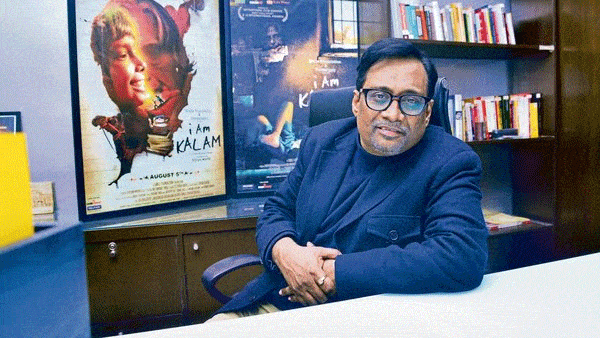(April 2, 2019 )

Mishra merged his love for good cinema with his profession as a social entrepreneur.
Kavita Devgan
Smile Foundation | I am Kalam
This is a CEO who has turned his hobby into a means to build up and promote his organisation’s work. An avid film-buff, Santanu Mishra, executive trustee of non-governmental organization Smile Foundation in Delhi, considers good cinema the best way to start discussions among young people about any issue, whether personal or professional, social or moral, local or global.
Mishra has successfully managed to merge his love for good cinema with his profession. Although Smile Foundation, which he co-founded in 2002 with a group of young corporate professionals, primarily works with the underprivileged in the areas of education, health, livelihood and empowerment, it also spreads awareness about important causes in civil society. Thanks to Mishra’s hobby, cinema has become one of the most powerful tools for Smile Foundation to sensitize communities, conduct outreach programmes and promote social venture philanthropy.
Mishra and his foundation have also produced films—his 2011 film I am Kalam, a film on the life and ideals of the former president, which won awards and critical acclaim, drew attention to the need for education for every child. He curated the first Smile International Film Festival for Children and Youth (SIFFCY) in 2015 to screen good cinema from all over the world for children. The event has grown and he now screens these films at various schools across the country. And it’s his passionate pursuit of a hobby that has helped the foundation find a new medium for awareness-building and support.
Mishra grew up watching Odia cinema. The 1976 classic on childhood love Sindura Bindu and Bhukha, the 1989 Sambalpuri hit based on a play, were early influences. “Both these movies stirred my soul and stayed with me,” he says. “I believe Sidhura Bindu and Bhukha were responsible for making me sensitive to others’ needs,” he says.
When he began travelling for work, he started attending film festivals and was exposed to world cinema. Mishra, a lawyer and an IIM-Ahmedabad alumnus, quit his corporate career and got involved full-time with the non-profit in 2005.
His love for films grew stronger and he decided to make films an integral part of his work. The foundation has also produced 60 short films between 2009 and 2013.
Recent world films that have influenced him include the Nepali film Pahuna, which was produced by actor Priyanka Chopra, Norway’s Los Bando made last year, 2017’s animated drama produced by Hollywood actor Angelina Jolie The Breadwinner, Swahili film Supa Modo, and 2018’s The Witch Hunters.
“All these movies come with a special message. Every time I watch them, I am inspired, and take home a different message,” he says. “I lose myself when watching good cinema. It absorbs me completely,” he adds. He makes it a point to track new releases, especially films that would appeal to young people, and also gets recommendations from friends, family and acquaintances.
“I have travelled to over 30 countries to watch and appreciate good cinema and I bring home the best for the children of my country. I want them to absorb the best from every part of the world,” he says. He plans to turn SIFFCY, currently an annual event in Delhi, into a larger national one over the next five years. He plans to take the film festival to Kolkata, Chennai, Mumbai and Bengaluru in the first stage, and later to Pune, Goa and Chandigarh.
Mishra believes that watching films helps him become a better communicator. “It makes me more sensitive towards my surroundings, which promotes a great work culture,” he says. It has taught him to give his employees space for creative thinking and to give free rein to their imagination. He says they are all free to come up with independent ideas to help their verticals grow and improve. This, he says, helps him maintain a strong workforce of over 450 employees and five offices. He believes cinema is also one of the most powerful sources of inspiration. “It teaches one about life by showing more about life than what one can experience,” he says. “You absorb a message unconsciously and start applying it to your daily life.”